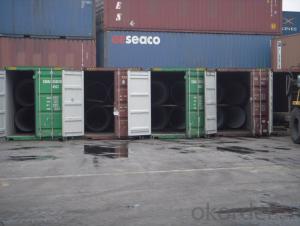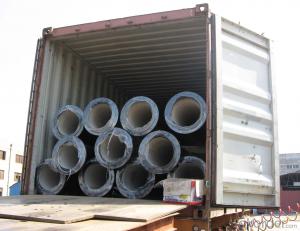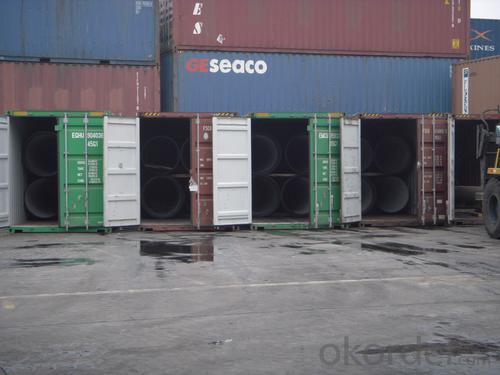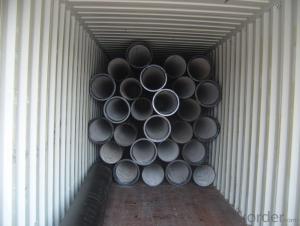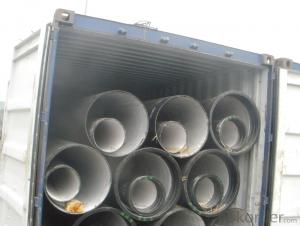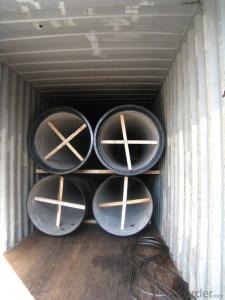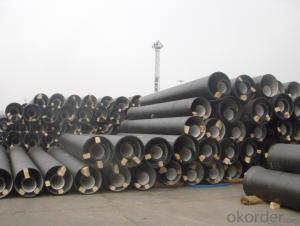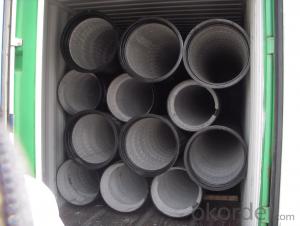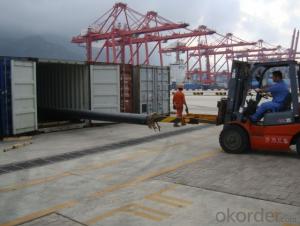DUCTILE IRON PIPE AND PIPE FITTINGS C CLASS DN1500
- Loading Port:
- Tianjin
- Payment Terms:
- TT OR LC
- Min Order Qty:
- 33 pc
- Supply Capability:
- 3000 pc/month
OKorder Service Pledge
OKorder Financial Service
You Might Also Like
· Material : Ductile Cast Iron
· Size Range : DN 80mm to DN 2000mm
· Unit Effective Length : 6m or 5.7m
· Manufacture Standard: ISO 2531:1998/ EN 545:2006/EN 598:2007
· Annual capacity : 200,000 tons
· Coating Exterior: Zinc 130g/m2 according to ISO 8179-1 and bitumen coating 70 microns.
· Cement Interior: Portland Cement/ High Alumina Cement/ Sulphate Resisting Cement Lining according to ISO 4179
· Special requirements on external coating and internal lining can be applied
· We also provide accessories such as SBR/EPDM rubber gaskets, lubricant paste, pipe caps, PE sleeves, etc.
Additional Parts:
Each pipe is strictly inspected according to related standard to ensure permanently high performance.
Easy Installation at site and service free for life
Long Service Lifespan
Quotation will arrive you within 24hours once we get your inquiry.
We guarantee offering you a competitive price.
A copy of original inspection reports of pipes will be offered after shipment.
Photos of loading process will be sent to the customer after shipment effect.
We will follow-up the delivery progress after shipment effect and update to the customer on weekly basis.
- Q: Can ductile iron pipes be used for irrigation canal lining?
- Ductile iron pipes are suitable for use in irrigation canal lining due to their strength, durability, and resistance to external pressure and impact. These pipes can withstand harsh environmental conditions such as high water pressure, soil movement, and exposure to chemicals and corrosive elements. The smooth interior surface of ductile iron pipes allows for efficient water flow and reduces the risk of clogging or sediment buildup, ensuring a continuous water supply for crops or plants being irrigated. Moreover, ductile iron pipes are highly resistant to damage from roots, rocks, or other objects that may come into contact with the canal lining. This reduces the likelihood of leaks or breaks in the irrigation system, resulting in a reliable and efficient irrigation process. It is important to consider factors such as canal size and capacity, water pressure requirements, and specific project conditions when selecting ductile iron pipes for irrigation canal lining. Seeking guidance from a professional engineer or irrigation specialist can help determine the most suitable materials for the project's specific requirements.
- Q: Are ductile iron pipes suitable for installation in areas with high soil compaction and traffic loads?
- Yes, ductile iron pipes are suitable for installation in areas with high soil compaction and traffic loads. Ductile iron pipes have high strength and durability, making them capable of withstanding heavy loads and compression from soil compaction. They offer excellent resistance to external forces and have a long lifespan, making them a reliable choice for such conditions.
- Q: What are the different methods for tapping ductile iron pipe?
- There are several different methods for tapping ductile iron pipe, depending on the specific requirements of the project. Some of the common methods used include: 1. Mechanical Tapping: This method involves using a mechanical tapping machine to create a hole in the ductile iron pipe. The machine is equipped with a cutting tool that rotates and cuts through the pipe wall, creating a clean hole. This method is commonly used for smaller diameter pipes and is relatively quick and efficient. 2. Hot Tapping: Hot tapping involves creating a hole in a pressurized ductile iron pipe while it is still in service. This method requires specialized equipment and expertise to ensure safety and maintain the integrity of the pipe. Hot tapping is commonly used when it is not feasible or practical to shut down the pipeline for maintenance or repair work. 3. Electrofusion Tapping: Electrofusion tapping is a method that uses an electrofusion saddle and fitting to create a branch connection on a ductile iron pipe. This method involves welding a fitting onto the pipe using an electrofusion machine, which creates a secure and leak-proof connection. Electrofusion tapping is commonly used for larger diameter pipes and is suitable for both water and gas applications. 4. Saddle Tapping: Saddle tapping involves attaching a saddle or clamp onto the ductile iron pipe and drilling a hole through the saddle into the pipe. The saddle is then equipped with a threaded outlet for connecting a branch line. This method is commonly used for smaller diameter pipes and is relatively simple and cost-effective. 5. Split Sleeve Tapping: Split sleeve tapping is a method that involves cutting a section out of the ductile iron pipe and installing a split sleeve over the cut. The split sleeve is then bolted together, creating a secure and watertight connection. This method is commonly used for larger diameter pipes and is suitable for both water and gas applications. It is important to note that the selection of the tapping method should be based on factors such as the pipe size, pressure rating, required branch connection, and the specific requirements of the project. Consulting with a professional engineer or tapping specialist is recommended to ensure the proper method is used for tapping ductile iron pipe.
- Q: How is ductile iron pipe manufactured?
- Ductile iron pipe is manufactured through a specific process known as centrifugal casting. The process starts with the melting of iron in a furnace, where specific elements such as carbon and silicon are added to achieve the desired properties. Once the iron is melted, it is poured into a spinning mold or a die that is rotating at a high speed. As the molten iron is poured into the rotating mold, centrifugal force pushes the liquid metal towards the inner surface of the mold. This force causes the metal to solidify from the outer surface inward. This results in a pipe with a dense outer layer and a more porous inner layer. The centrifugal casting process ensures that the pipe's outer surface is free from impurities and defects, ensuring its strength and durability. After the pipe has solidified, it is removed from the mold and undergoes further processing. The pipe is cleaned, excess material is trimmed off, and any surface imperfections are removed. It is then treated with a protective coating, such as zinc or epoxy, to enhance its corrosion resistance. The final step in the manufacturing process is quality control and testing. Ductile iron pipes are subjected to various tests to ensure they meet the required standards, including hydrostatic pressure testing, dimensional inspection, and internal and external coating inspection. In summary, ductile iron pipe is manufactured through the centrifugal casting process, which involves melting iron, pouring it into a rotating mold, and allowing it to solidify under centrifugal force. The resulting pipe is then cleaned, coated, and undergoes rigorous quality control to ensure its strength, durability, and adherence to standards.
- Q: What is the expected pressure rating for ductile iron pipes?
- The expected pressure rating for ductile iron pipes typically ranges from 150 to 350 psi.
- Q: Are ductile iron pipes suitable for underground applications?
- Indeed, underground applications are well-suited for ductile iron pipes. Renowned for their durability, strength, and resistance to corrosion, these pipes emerge as an excellent option for installations that lie beneath the surface. Their ability to withstand immense loads, ground shifts, and external pressure further solidifies their appropriateness for burial underground. Moreover, given the challenges associated with access and maintenance in underground scenarios, the fact that ductile iron pipes boast a lifespan of over 100 years becomes invaluable. In conclusion, the reliability and suitability of ductile iron pipes for underground applications are underscored by their robustness and longevity.
- Q: Are ductile iron pipes suitable for use in hydropower projects?
- Indeed, ductile iron pipes prove to be a suitable option for implementation in hydropower projects. Possessing a remarkable tensile strength and corrosion resistance, these pipes emerge as the ideal choice for applications in hydropower projects where water flow and pressure play a significant role. Demonstrating the ability to endure high pressure and boasting durability, these pipes guarantee long-term reliability and safety within hydropower systems. Furthermore, when compared to alternative materials such as steel, ductile iron pipes present a cost-effective solution, rendering them a favored selection for hydropower projects. In summary, ductile iron pipes possess the essential characteristics and performance qualities necessary to meet the rigorous conditions encountered in hydropower projects.
- Q: Can ductile iron pipes be used for cooling water systems?
- Indeed, cooling water systems can utilize ductile iron pipes. Renowned for their resilience, robustness, and resistance to corrosion, ductile iron pipes are a fitting choice for various applications, including cooling water systems. With the ability to withstand high pressure and temperature fluctuations, these pipes excel in circulating and transporting cooling water. Moreover, their smooth interior surface mitigates friction, diminishing the likelihood of scaling or blockages and enabling the efficient flow of cooling water. Consequently, ductile iron pipes emerge as a dependable and efficient option for cooling water systems.
- Q: How can the ductile iron pipe be welded?
- If the hole on the ductile iron pipe, you can use special hoop lined flexible rubber ring, rubber ring and pipe wall coating with rubber ring, glue to be fixed.
- Q: Are ductile iron pipes suitable for use in oil refineries?
- Yes, ductile iron pipes are suitable for use in oil refineries. They have excellent corrosion resistance and high tensile strength, making them ideal for transporting various fluids and gases in harsh environments such as oil refineries. Additionally, their flexibility and durability allow for easy installation and maintenance, ensuring reliable operations in refinery facilities.
Send your message to us
DUCTILE IRON PIPE AND PIPE FITTINGS C CLASS DN1500
- Loading Port:
- Tianjin
- Payment Terms:
- TT OR LC
- Min Order Qty:
- 33 pc
- Supply Capability:
- 3000 pc/month
OKorder Service Pledge
OKorder Financial Service
Similar products
Hot products
Hot Searches
Related keywords
